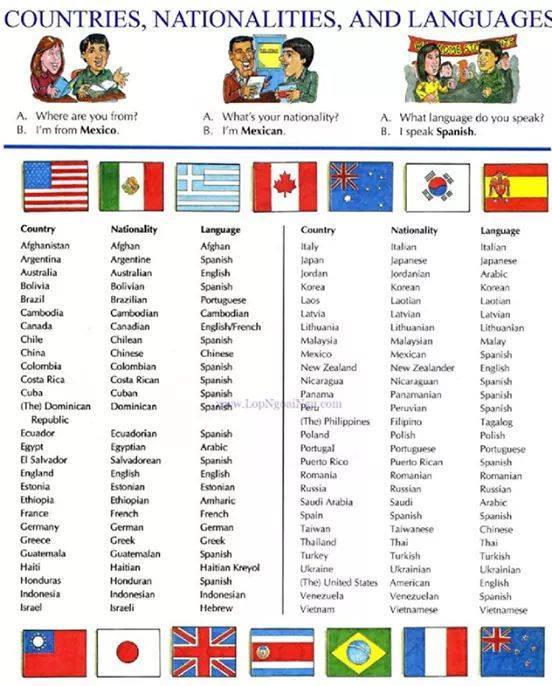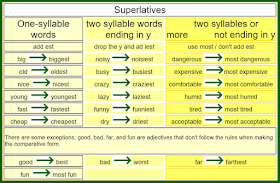Pages
▼
Saturday, 28 February 2015
Friday, 27 February 2015
Mr., Mrs., Miss OR Ms.
What must you say/write before a person's surname when addressing a person in a formal way? Here's the explanation and meaning behind.
Thursday, 26 February 2015
REVIEWING: 8 MISTAKES YOU SHOULDN'T DO
Here's a list of mistakes you should try to avoid:
8 Mistakes You Must Correct:
- 1
Problems with Subject-Verb Agreement
Some of the most painful things teachers have to hear are “she have”, “he don’t” or “people doesn’t”. Ouch! This is such a typical mistake. Because this is something you repeat and are used to repeating, you may “listen” to our correction but often don’t take the time to really let it sink in. If you are students who make the same subject-verb agreement mistakes, take the time to stop and really pay attention to it. - 2
Incorrect Verb Tenses
These mistakes crop up again and again. If there’s one thing students need to focus on as they review for a test is the tenses they’ve learned, whether they are simple or advanced. Help by providing plenty of comparative charts – graphic organizers or timelines. - 3
Missing or Extra Articles
Some students add an extra “the” when they shouldn’t (“The children play the Angry Birds.”) or omit an article that should be there (“I ate piece of toast for breakfast”). If you make lots of mistakes with articles, be sure to get a good review. - 4
Repetitive Use of False Friends
Lots of languages, if not all, have “false friends” with the English language. For example,embarazada means “pregnant” in Spanish not “embarrassed” (and this confusion can make for some pretty funny classroom situations). There are examples like this one in many other languages. If you are students who resort to false friends, or even like to make up words, no matter how funny it may seem, you should try to use words you are sure are correct because you’ve learned them. - 5
Pronunciation of Silent Consonants
If you have students who still pronounce the silent b in “comb” or “bomb”, you need to take a minute to write these down on the board and show them exactly which letters they need topronounce. The same goes for words like “Wednesday” (when the student pronounces the first d) or “muscle” (when the student pronounces the c as a “k”). - 6
Speaking through Literal Translations
Everything seems to be going well in your classroom. Your students are very attentive and no one is speaking their native language. But then someone says, “I have 20 years.” If you, like this student, are also a native Spanish speaker, you’ll know for a fact your student just did a literal translation in his/her head. Students will do this, you can be certain of that, but it’s something you need to correct right away, lest they keep doing it. - 7
Wrong Prepositions
This is one of the hardest mistakes to correct. There are so many uses for so many different prepositions, it’s hard for students to keep track of them all. One of the best ways to help out students who perpetually use the wrong preposition is to organize them into contexts, for example prepositions of place. We say we are “at school”, “at work”, “at home”, but “in the living room”, “in the bedroom” (“in” a particular room). We may also point out the difference between saying “at the bank” (in a bankingsituation) and “in the bank” (literally inside the building as opposed to outside). - 8
Countable/Uncountable Mix-ups
Students in all levels will get countables and uncountables mixed up and incorrectly use “a little”, “a few”, “many”, “much”, etc… Again, charts and graphics are very helpful in this case, to help students see exactly what they’re doing wrong. You can use the classic two-column list to contrast (“a few cars” vs. “a little traffic”) or any of these strategies.
Wednesday, 25 February 2015
ZERO ARTICLE
We say ZERO ARTICLE when no article is needed. Many mistakes are made using the article when it's not needed, Below when we don't need one:
Below a chart where you can see examples of when ZERO ARTICLE is used:
Compare in the chart below when to use ZERO ARTICLE and ARTICLE THE:
Tuesday, 24 February 2015
Monday, 23 February 2015
INFORMAL CONTRACTIONS
These are contractions mostly heard when speaking, but not usually seen in written speech (unless it's a transcription of spoken speech). Here are a collection of informal contractions, that is, contractions used in colloquial speech, never in formal or written situations. Informal use of English, when speaking with family and friends or texting/chatting on the internet.
- Phonetical contractions: heard when speaking
Watch the video for more detailed information.
Video:
Saturday, 21 February 2015
"WHERE DID U GO?", MIDNIGHT RED
Bringing you a song to sing along: "WHERE DID U GO?" by Midnight Red, an American boy band formed by Colton Rudloff, Joey Diggs Jr., Thomas Augusto, Eric Secharia & Anthony Ladao.
Video+lyrics "WHERE DID U GO?"
Friday, 20 February 2015
WRITING IN THE XXIst CENTURY: A REMINDER OF THE PROJECTS PROPOSED BY THE ENGLISH DEPARTMENT FOR THE 6th CULTURAL WEEK
(6th Cultural Week-6: Writing in the 21st century)
Here's a reminder of the projects we have proposed from the Department of English to participate in the 6th Cultural Week: The History of Handwriting. You can link from here to the original posts on this blog. You can participate in one, two... or all of them. The best will be exhibited and used as quizzes during the cultural week.
- PROJECT 1 - TEXT MESSAGING:
WRITE TEXT MESSAGES IN ENGLISH USING ABBREVIATIONS FOR OTHER STUDENTS TO DECODE INTO ENGLISH & ALSO TRANSLATE INTO GALICIAN/SPANISH.
PROJECT 2 - LITERARY HANDWRITTEN QUOTATIONS:
GIVE A HANDWRITTEN LITERARY QUOTATION IN ENGLISH OF A BOOK YOU'VE ENJOYED.
PROJECT 2 - LITERARY HANDWRITTEN QUOTATIONS:
GIVE A HANDWRITTEN LITERARY QUOTATION IN ENGLISH OF A BOOK YOU'VE ENJOYED.
- PROJECT 3 - SMILEYS/EMOTICONS:
WRITE MESSAGES USING SMILEYS/EMOTICONS FOR OTHER STUDENTS TO DECODE INTO ENGLISH & ALSO TRANSLATE INTO GALICIAN/SPANISH.
WRITE MESSAGES USING SMILEYS/EMOTICONS FOR OTHER STUDENTS TO DECODE INTO ENGLISH & ALSO TRANSLATE INTO GALICIAN/SPANISH.
- PROJECT 4 - TWEETS:
WRITE ORIGINAL OR FUNNY TWEETS IN ENGLISH. REMEMBER NOT MORE THAN 140 LETTERS. YOU MAY USE ABBREVIATIONS LIKE WHEN TEXT MESSAGING.
- PROJECT 5 - PICTOGRAMS:
a) CREATE YOUR OWN PICTOGRAMS. MAKE PEOPLE GUESS WHAT THEY MEAN. ANSWERS MUST BE SHOWN IN ENGLISH.
b) DO YOU KNOW ABOUT ANY OTHER SET OF PICTOGRAMS WIDELY USED? FIND OTHERS, THEIR MEANINGS MUST BE LATER GUESSED & WRITTEN IN ENGLISH BY OTHER STUDENTS.
Tuesday, 17 February 2015
COUNTRIES, NATIONALITIES & LANGUAGES
Using the suffixes below you can make the adjectives of nationalities. Check on the charts below some of the most common. There's also a link to an article about some English expressions with nationalities.
Suffixes:
- -ish (English, Danish, British, Turkish, Spanish)
- -ese (Japanese, Chinese, Portuguese, Vietnamese, Taiwanese)
- -ean (Korean, Chilean, Guinean, Singaporean, Zimbabwean)
- -ian (Norwegian, Australian, Belarusian, Canadian, Macedonian)
- -an (American, German, Mexican, Moroccan, Libyan)
- -i (Pakistani, Azerbaijani, Israeli, Somali, Uzbekistani)
- -ic (Icelandic, Greenlandic)
- -er (Icelander )
Monday, 16 February 2015
APOLOGIZING
In the following chart, you can see the different ways to apologize and say sorry depending on the situation (formal, informal or slang) and the way (spoken or written).
Friday, 13 February 2015
VALENTINE'S DAY 2015: ED SHEERAN'S "THINKING OUT LOUD"
Being February and tomorrow the 14th means it'll be Valentine's Day once again. Some say it's an invention of shopping centres to sell flowers, chocolates, jewellery, gifts... but we know there's a historic origin of this festivity (look HERE).
Link to TEN FACTS ABOUT VALENTINE'S DAY.
Watch an animated video cartoon of the history of Valentine's Day:
Another video about "THE SCIENCE OF LOVE" or how American live their personal lives. Most of them live single. Watch the video, you can put subtitles.
Link to TEN FACTS ABOUT VALENTINE'S DAY.
Watch an animated video cartoon of the history of Valentine's Day:
Another video about "THE SCIENCE OF LOVE" or how American live their personal lives. Most of them live single. Watch the video, you can put subtitles.
On this blog we usually celebrate it with romantic short stories and songs, for previous Valentine posts, click here.
This year we also want to add a new song to the collection.
This year we also want to add a new song to the collection.
This year, we're posting one of Ed Sheeran's latest hits "THINKING OUT LOUD".
Video "THINKING OUT LOUD", Ed Sheeran:
Friday, 6 February 2015
COMPARATIVES & SUPERLATIVES
Here's a chart to understand how to make the comparatives and superlatives of adjectives in English. At the end, below there's a game.
The game:
The game:

































.jpg)















